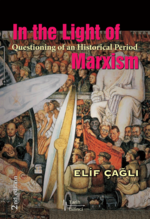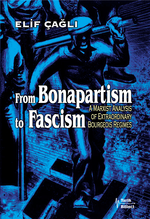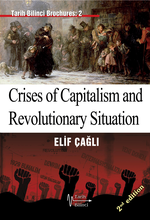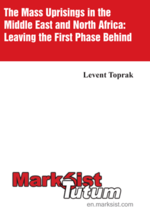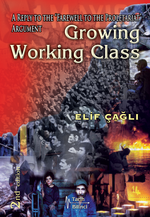Capitalism makes the mankind suffer hell. The reign of a handful capitalists makes billions of people all over the planet suffer in the grip of hunger, poverty and deprivation, unemployment, incredible inequality and injustice, bloody wars, oppression and torture, endless decay and alienation. The only force that can save mankind from this swamp and lead it to socialism is the working class which is said to be “extinct”. The truth is that, the billions who strive to survive through selling their labour force in return for a wage, i.e. the working class, still have nothing to lose but their chains. But they have a world to win!
Marksist Tutum
January 2024
In the following document we, Marksist Tutum, present our perspectives and a general framework of our analyses of the political, economic and social developments in the world and Turkey, which will guide us in the period of struggle ahead.
Questioning of an Historical Period
Elif Çağlı
May 1991
Is there any room for a "socialism in one country" in Marx's scientific theory of socialism? Is there a separate socio-economic formation called "socialism" in itself independent from communism in Marx's theory? Can the socialist organisation of society (which is classless society) be compatible with the simultaneous presence of a "nation-state"? Can there really be a workers' democracy if the workers do not rule, even if there is a state conducting "in the name of" the working class, organised in a bureaucratic manner with its professional army and police, judicial and administrative machinery? Or, in such a "workers" state, in whose hands would be the real power: in the hands of workers, or of some others? In this book, Elif Çağlı deals with these questions and other similar ones, and gives answers on the basis of Marxism.
A Marxist Analysis of Extraordinary Bourgeois Regimes
Elif Çağlı
August 2004
In this book, Elif Çağlı, by taking into consideration a wide range of experiences ranging from Louise Bonaparte's experience of 18 Brumaire during the Marx era in France to the Bismarck era in Germany, from Italian and German fascism to Spain and Portugal, from Greece to Latin America, reveals the forms and evolutions of the extraordinary regimes of the bourgeoisie, how these regimes should be evaluated and on which theoretical-political foundations this evaluation should be based. Undoubtedly, the Turkish experience constitutes an important page here. Çağlı presents a Marxist perspective on the history of modern Turkey by discussing the establishment process and the subsequent evolution of the bourgeois regime in Turkey, the coups and the question of the character of the regimes they gave rise to.
Elif Çağlı
2 June 2005
In recent years, a great deal has been written and said about globalisation. The imperialist powers even derived an ideology which is expressed with this concept, and which corresponds to their worldwide interests. To such an extent that, everything is being explained via this concept: Global economy, global interests, global terror, global assault, global defence, global hazards etc. Under conditions that the socialist movement is at the bottom and the bourgeois ideology has gained strength, the concept of globalisation has been almost declared as the motto of the twenty-first century. The liberal and reformist left circles that tailed after the bourgeois ideology theorised the fact of globalisation in accordance with the interests of the bourgeoisie. Globalisation has been and is being presented decorated with pompous labels like “post-capitalist society” or “information society” as if it were a magic potion that would eternalize the capitalist mode of production.
Controversial Issues on National Question
Elif Çağlı
August 2002
In From Colonialism to Imperialism Elif Çağlı examines the prevailing misconceptions of imperialism and their consequences which meant distortion of Marxism leading to crippling of proletarian revolutionary struggle. She demonstrates that this distortion starts with equating colonialism and imperialism and leads to separation of anti-imperialist struggle and struggle for proletarian revolution against capitalist system, to reduction of anti-imperialist struggle to a mere question of "national independence", to emergence of extremely false theories in the example of "neo-colonialism".
Elif Çağlı
12 April 2003
A very intensive debate over the question of European Union has been conducted in recent years. But it is hard to say that, a well-built and a complete Marxist perspective could be suggested, especially by the leftist group in Turkey. This pamphlet composed of three section aims to suggest such a Marxist perspective.
Elif Çağlı
2 November 2003
Despite all its ups and downs, capitalist system displayed a general economic dynamism during the period between the end of the Second World War and the beginning of the 21st century. Following deep crises and the two big world wars which had cost lives of millions, this period of dynamism gave rise to a popularisation of the idea that “capitalist production process has changed its character to a great extent.” Economists proudly announced, with their chests puffed out, that capitalist system had reached enough maturity to overcome crises and entered a new epoch leaving behind all characteristics of the old one.
Elif Çağlı
29 July 2012
Under present conditions where the working class has no revolutionary international organisation, there is no other way of struggle than to labour and work out revolutionary Marxist solutions and try to carry them over to international platforms. Therefore it is inevitable to get involved in various experiments to solve the question of international organisation of the working class. It must be kept in mind that all great revolutionary advances could be successful thanks to revolutionary class attitude, which means plunging into actual work without being intimidated by difficulties and daring to experiment.
Elif Çağlı
23 December 2006
The struggle for the creation of the international organization of the working class requires intransigence in principles and flexibility in tactics. Neither opportunism pursuing short term so-called political achievements nor sectarianism unwilling to see and accept anything other than its own small organization can be of any use for this struggle. The reality we face today in the issue of building the revolutionary international organization of the proletariat puts very important responsibilities and tasks over the shoulders of the internationalist communists. Those who are self-confident will continue revolutionary efforts in every field undertaking these responsibilities and tasks. Those who are not intimidated will move forward. All big problems in history have been resolved this way.
Elif Çağlı
March 2010
When you look into the various cases of opportunist tendencies within Marxist movement you cannot but see that a common feature of all opportunist tendencies is to turn a deaf ear to revolutionary criticism. Although the opportunists sometimes seem to accept general revolutionary principles when they are squeezed, in effect they keep following their well-trodden opportunist way. Thus opportunism makes upsurges that are generally unavoidable. Giving concrete examples will surely make clear these features of opportunism that we state here very briefly. As a striking example we can take the upsurge of opportunism in the case of the IMT (International Marxist Tendency) lead by Alan Woods.
Elif Çağlı
28 November 2005
Although such experiences are pleasing in themselves since they carry forward the mass of the class, they are by no means enough for the working class to break the chains of wage-slavery and achieve freedom. Conditions of emancipation can develop depending on the quality and quantity of the distance taken by workers towards political consciousness and organisation. In this respect, it has a vital importance to make sure that at least the vanguard elements of the class are capable of answering the questions such as “what kind of organisation?” or “what kind of a unity?” in a way to carry forward the struggle.
Marksist Tutum
September 1994
The importance of theoretical struggle on national question springs essentially from the need to take a correct political attitude based on Marxist foundations in the face of the liberation struggle of oppressed nations. Marxism is not an impressionist or positivist philosophy limiting itself only with interpreting the world, but an integral world view which strives to change the world and develops in an inextricably dialectical relationship with revolutionary practice.
Marksist Tutum
4 July 2012
The process of the capitalist development of Turkey is a rather belated process with respect to the West. This historical delay flows from the peculiar socio-economic structure upon which Turkish capitalism developed. For this reason, in order to understand the peculiarities of Turkish capitalism, it is necessary to have an overview of the economic and social history of the Ottoman Empire that forms the historical background of modern Turkey today.
Levent Toprak
1 March 2011
The wave of popular uprisings that started in Tunisia and continued with Egypt embracing North Africa and the Middle East has reached a new phase. Though one needs to analyse the situation in Egypt in the aftermath of Mubarak’s overthrow, there is no doubt that the process of mobilisation of millions and Mubarak’s eventual step-down in itself is already a serious source of inspiration in the eyes of other Arab peoples. New upsurges of mass movement that are taking place especially in Yemen, Bahrain and Libya are a demonstration of this fact. Whatever the short term results of this mass wave of revolt it is clear that there is a new era in this region unfolding and that nothing will be the way as they were so far. The social-political struggles to take place in this region in the period ahead and the kind of regimes to be established will be the focus of attention for revolutionaries as well as bourgeois political realm.
A Reply to the “Farewell to the Proletariat” Argument
Elif Çağlı
It is the globalised proletariat, not the “popular alliances” dominated by the petty-bourgeoisie, that is ringing the danger bells of the globalising capitalist order of exploitation. Our aim in this book is to clarify the reality of the working class in various aspects under the shining scientific light of Marxism. The plain truth revealed by this study, which is carried out on the basis of the analyses of Marxist theory without being deceived by the distortions of bourgeois statistics and without drowning the reader in figures, is this: The working class is growing, in spite of those who want to say goodbye to it or try to downplay it.



